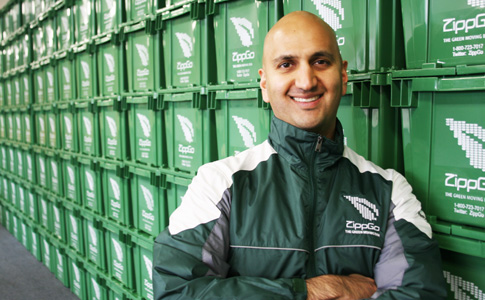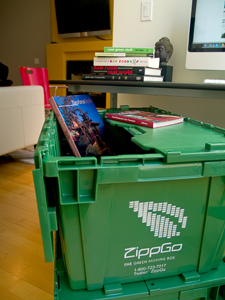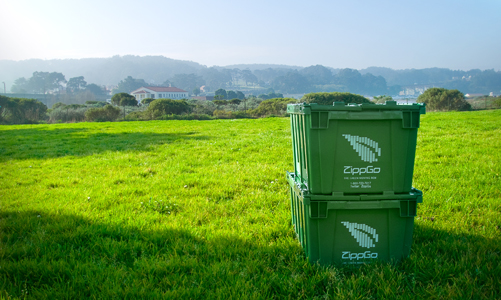According to U.S. Census Bureau statistics, more than 40 million Americans move each year.

Ash Sud founded ZippGo in 2009. After moving into a new apartment and unpacking his belongings, the Bay Area native says he found himself with a pile of cardboard boxes to break down and recycle. “I thought, ‘There’s got to be a better way to [move].’” Photo courtesy of Zippgo.com
By Bill Picture
Published: February, 2011
|
|
According to U.S. Census Bureau statistics, more than 40 million Americans move each year. Multiply that number by the number of cardboard boxes that each of those 40 million people will use to pack and transport their belongings, and the potential negative impact on the environment is astonishing. But an enterprising Bay Area resident has come up with a way to make moving not only greener, but more efficient as well.
“After I moved into the place I’m living in now, I had this big stack of cardboard boxes left to deal with; and I thought, ‘There’s got to be a better way to do this,’” said Ash Sud, founder of ZippGo. The San-Francisco-based company delivers reusable plastic moving boxes for its customers to use in transporting their belongings from Point A to Point B, then picks the boxes back up after the move at Point B for the next ZippGo customer to use. It’s also worth mentioning that ZippGo’s delivery fleet is entirely biodiesel-powered.
Still, some may ask, “If cardboard is recyclable, then why are ZippGo’s plastic containers better than cardboard boxes?” Sud has the answer: “Recycling is good, but reusing is better.”
Most will be surprised to learn that recycling a cardboard box uses only 30 percent less energy than that used to make a new box. So while recycling a cardboard box is much better than throwing it away, it’s not necessarily the greenest option. Nor is it the cheapest option.
ZippGo’s containers are made from recycled plastic (that’s plastic that would likely otherwise end up in a landfill); and the smallest container costs only $1. To put that in perspective, U-Haul charges $1.43 for a comparable-size cardboard box—almost 50 percent more.
“People don’t move that often so I think they forget how expensive cardboard boxes actually are,” Sud said. “When I went to go buy boxes, I was shocked. We think of cardboard as being this cheap material, but it’s really not.”
Still, Sud believes that the ease of ZippGo’s ready-to-use plastic containers—the containers are delivered already assembled and have handles for easy carrying—and the convenience of ZippGo’s delivery/pickup service are what attract customers, more so than either price or environmental-friendliness.
“The convenience factor definitely trumps the green,” he said. “We’re all busy people, so we’re always looking for ways to save some time. With cardboard boxes, you have to go buy the boxes, find some way to get them home, which is a huge pain if you don’t have a car. Then, when you get home, you have to spend time putting the boxes together and taping them up. After the move, you have to break the boxes down and put them outside for recycling to pickup. It’s a hassle. And don’t forget about all that used packing tape, which isn’t recyclable.”
A green awakening
Given Sud’s roots in the ever-greener Bay Area and his knack for developing solid green business ideas—he previously owned a successful organic grocery delivery service—it would seem that the East Bay native was, in a way, green from the get-go. But Sud says his green journey didn’t actually begin until much later in life.
“Growing up, it wasn’t a part of my vocabulary,” he said. “My family had a retail business when I was young, then a metal manufacturing business, and the environment just wasn’t something any of us thought about at all, much less talked about.”
It wasn’t until well after college, when Sud began reading about the health and environmental benefits of eating organic food, that he became aware of the huge impact that individuals can have by making small lifestyle changes. “Suddenly, I felt a responsibility,” he explained. “And I started looking for ways that I could make small changes in my regular, day-to-day life. Then the entrepreneur in me started trying to come up with ideas for a green business.”
Sturdy boxes, sturdy business
It hasn’t taken long for word of mouth to spread. Launched in November 2009, ZippGo has seen its business increase by at least 25 percent every month. In fact, the company just celebrated a record month in December. “And we haven’t done much of anything in the way of advertising,” Sud said. “It seems like, once people use us, they swear by us.”
It’s not hard to see why. In addition to being cheaper, greener and more convenient, ZippGo’s plastic containers are also sturdier than cardboard and easier to stack. Every order also includes free use of a dolly, something that usually has to be rented.
“And they really help cut down on move time,” Sud said, “which can save you a lot of money when you’re paying a moving company by the hour. If you look us up on Yelp, you’ll see that all of our reviewers talk about how much easier our containers made their moves.”
Since launching, ZippGo has expanded its inventory to include three different sizes of containers, as well as a variety of green packing accessories, including environmentally friendly alternatives to both non-recyclable plastic bubble wrap and Styrofoam packing peanuts.
For now, ZippGo’s services are only available in and around the Bay Area. But Sud has plans to expand ZippGo into the Los Angeles and New York City markets in the near future.
“That’s going to require some outside funding, of course, and we’re working on putting a plan together for that,” he said. “First, though, we have to change people’s way of thinking. For the longest time, cardboard was sort of people’s default answer to the packing problem. That’s all there was, so it’s a matter of letting people know that there’s now a better alternative.”
For more information on ZippGo, visit www.zippgo.com

ZippGo’s plastic moving containers come in three sizes and start at just $1.00 per box. They’re sturdier than cardboard, come already assembled, and are easier to carry, thanks to built-in handles. Photo courtesy of Zippgo.com

ZippGo’s plastic containers are made of recycled plastic, which would likely otherwise end up in landfills. Cardboard is recyclable; however, the recycling process uses 70% of the energy required to make a new box. “Recycling is good,” says company founder Ash Sud. “But reusing is better.” Photo courtesy of Zippgo.com

